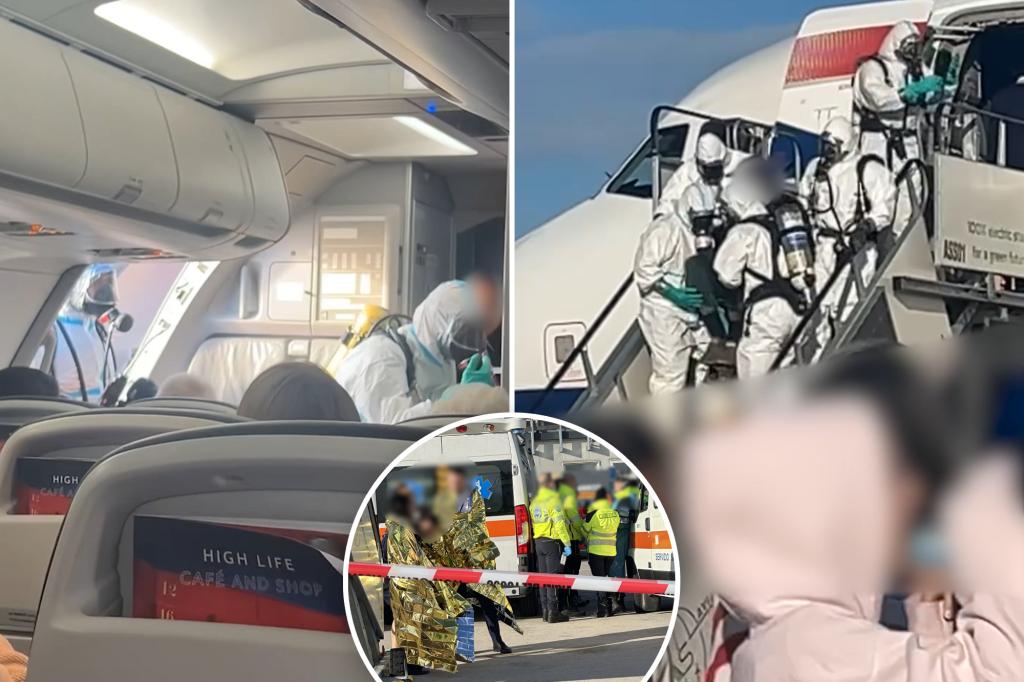When a Dream Vacation Turns into a Nightmare: British Airways Flight Emergency
In what should have been the beginning of a relaxing getaway, Melanie Wells and her 19-year-old daughter found themselves in what Wells described as “a flight from hell.” The 61-year-old East Sussex resident had planned a $10,000 all-inclusive vacation to Sharm El Sheikh, a picturesque city on Egypt’s Red Sea coast. The trip was meant to be therapeutic for Wells, who hadn’t been feeling well and hadn’t traveled in quite some time. “I hadn’t been away for ages, it was definitely much-needed,” she recalled, looking forward to the restorative effects of sun, sea, and relaxation. Instead, what unfolded was a harrowing experience that would turn their dream vacation into a 40-hour ordeal of fear, confusion, and illness.
The trouble began immediately upon boarding the British Airways flight from London to Egypt. Wells noticed the cabin temperature was extraordinarily high—”supersonically hot,” as she put it—and soon developed a severe headache. Initially attributing her discomfort to the unusual heat, Wells’ concern grew when she observed she wasn’t suffering alone. Approximately ninety minutes into the flight, crew members began rushing up and down the aisles with increasing urgency. The situation rapidly deteriorated as passengers and crew members alike began falling ill. “There was one mom whose eyes rolled into the back of her head. The crew looking after them had actually collapsed,” Wells recounted. By her count, six people aboard the aircraft were suffering from various symptoms. Wells herself experienced nausea alongside her persistent headache, and she became convinced they were all inhaling toxic fumes of some kind.
The severity of the situation prompted an emergency landing in Venice, Italy, where the scene that greeted passengers did little to calm their fears. Emergency vehicles surrounded the aircraft as soon as it touched down, and the situation took on an even more alarming aspect when emergency personnel in hazmat suits and breathing apparatus boarded the plane. These workers began testing both the afflicted passengers and crew members, leaving Wells “absolutely terrified” as she wondered about the possibility of toxic exposure. Adding to the passengers’ distress was what Wells described as a lack of communication from the flight deck. “At no point did the captain give us any information,” she claimed, noting that even the typically composed airline staff appeared to be in “pure panic mode.” The scene she described was one of “pure pandemonium,” with worried passengers left to speculate about what might be happening.
After an eight-hour delay in Venice, during which time passengers were presumably cleared of any serious health risks, the flight returned not to its intended destination but back to London. This meant that Wells and her daughter would only arrive in Egypt the following morning—a full day later than planned. “We were traveling for 40 hours. We were utterly exhausted,” Wells lamented, characterizing the entire experience as “horrific.” The ordeal took its toll not only physically but emotionally, with Wells later describing it as “utterly traumatic” and claiming it “ruined the start of our holiday.” What should have been a seamless journey to a restorative vacation had become an endurance test of patience, uncertainty, and fear, compounded by what Wells perceived as a lack of proper care and communication from the airline.
In the aftermath of the incident, Wells filed a complaint with British Airways, which reportedly responded with an offer of approximately $3,000 in compensation. This amount was intended to cover the cancelled flight, meal expenses, and other hardships experienced during the extended travel time. However, Wells expressed dissatisfaction with the airline’s refusal to reimburse the $667 cost of their missed first night in Egypt—a direct consequence of the flight diversion and subsequent delays. “BA have performed in the most cavalier manner,” she stated, clearly feeling that the compensation offered did not adequately address the distress she and her daughter had endured. Her criticism points to a common complaint in air travel disruptions: while airlines may compensate for tangible expenses, the emotional impact and lost vacation time are harder to quantify and redress.
British Airways, for its part, has been somewhat circumspect about the specific cause of the inflight illnesses. The airline characterized the diversion as a precautionary measure due to a “technical issue” rather than addressing Wells’ claims about noxious fumes directly. A spokesperson stated, “We’ve apologized to our customers for their experience and have offered compensation accordingly,” adding that there was “no evidence of fumes on board” and that the aircraft was inspected and returned to service the following day. This discrepancy between the passenger’s perception of events and the airline’s official position highlights the often contentious nature of airline incident reporting and passenger compensation. While Wells and others on board believed they were experiencing symptoms of toxic exposure, the airline’s investigation apparently found no such hazard. The incident serves as a sobering reminder that even in the age of modern aviation, unexpected events can transform what should be the exciting beginning of a vacation into a memorable ordeal for all the wrong reasons.


